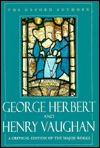- Bíblia
- Leia a Bíblia
- Versões da Bíblia
- Verso do dia
- Planos de Leitura
- Versos por Tópico
- Books of the Bible
- Imagens bíblicas
- Estude
- Comentários
- Concordâncias
- Dicionários
- Enciclopédias
- Sermões
- Bible Atlas & Maps
- BP Wiki
- Devocionais
- Devocionais de hoje
- Light of the World
- Todos os devocionais
- Inspirational Quotes
- Mais
- Picture Quotes
- Videos
- Inspirador
- Estudo da Bíblia
- O que a Bíblia diz
- Bible Q&As
- Daily Bread
- Bible by Genre
- Bible Stories
- Random Bible Verse
- Comunidade
- Store
George Herbert and Henry Vaughan
by George Herbert
This volume presents the work of two poets linked by the tribute of creative imitation gratefully paid by Vaughan to Herbert. Read side by side, as this one-volume collection makes possible, the artists' verse fully reveals their individual powers, even as the complex nature of Vaughan's use
of Herbert's imaginative example is thrown into greater relief. The book contains the complete English poetry of Herbert, his prose treatise, The Country ParsonThe Country Parson, the complete text of Vaughan's Silex ScintillansSilex Scintillans, including all material in both the 1650 and 1655 editions, and a selection from
Vaughan's early secular poetry. Louis Martz's introduction and commentary help bring the religious controversies of the age into focus. The text also features chronologies of the lives of the two men and suggestions for further reading.
of Herbert's imaginative example is thrown into greater relief. The book contains the complete English poetry of Herbert, his prose treatise, The Country ParsonThe Country Parson, the complete text of Vaughan's Silex ScintillansSilex Scintillans, including all material in both the 1650 and 1655 editions, and a selection from
Vaughan's early secular poetry. Louis Martz's introduction and commentary help bring the religious controversies of the age into focus. The text also features chronologies of the lives of the two men and suggestions for further reading.
BUY NOW
Paperback, 608 pages
Published June 5th 1986 by Oxford University Press, USA
Se inscrever
© 2025 Bibleportal.com Todos os direitos reservados.

George Herbert was a Welsh poet, orator and priest. Being born into an artistic and wealthy family, he received a good education which led to his holding prominent positions at Cambridge University and Parliament.
As a student at Trinity College, Cambridge, England, George Herbert excelled in languages and music. He went to college with the intention of becoming a priest, but his scholarship attracted the attention of King James I. Herbert served in parliament for two years. After the death of King James and at the urging of a friend, Herbert's interest in ordained ministry was renewed.
In 1630, in his late thirties he gave up his secular ambitions and took holy orders in the Church of England, spending the rest of his life as a rector of the little parish of St. Andrew Bemerton, near Salisbury.
He was noted for unfailing care for his parishioners, bringing the sacraments to them when they were ill, and providing food and clothing for those in need.
Throughout his life he wrote religious poems characterized by a precision of language. He is best remembered as a writer of poems and the hymn "Come, My Way, My Truth, My Life."
... Show more